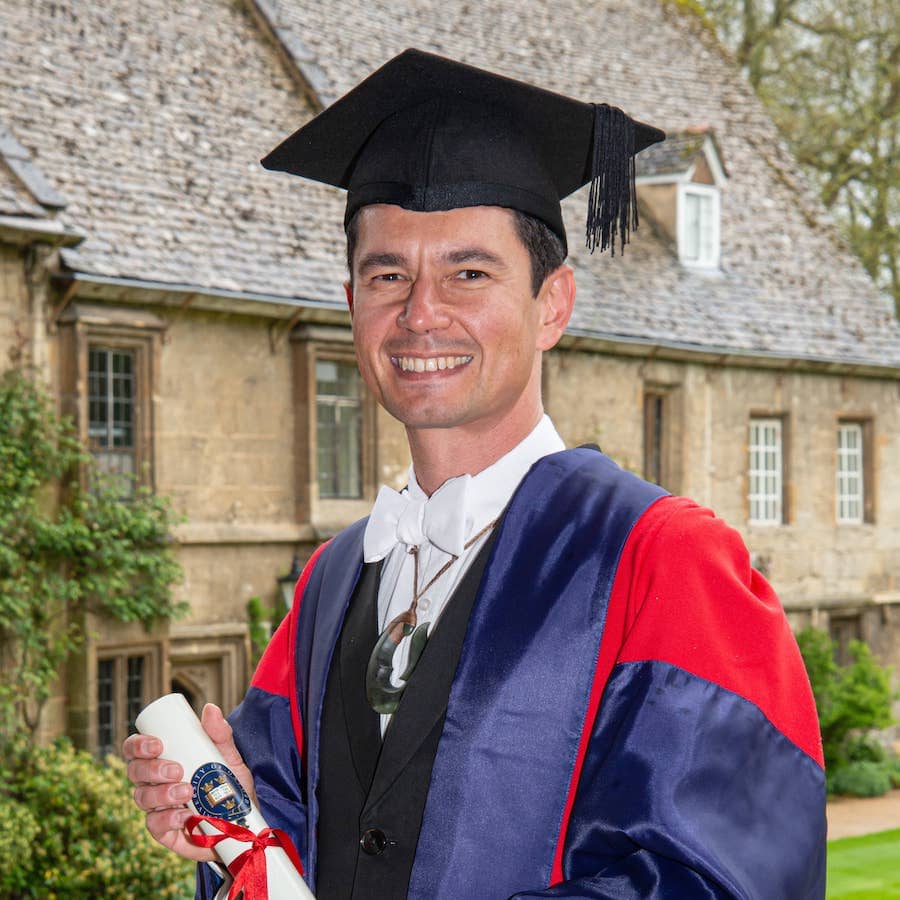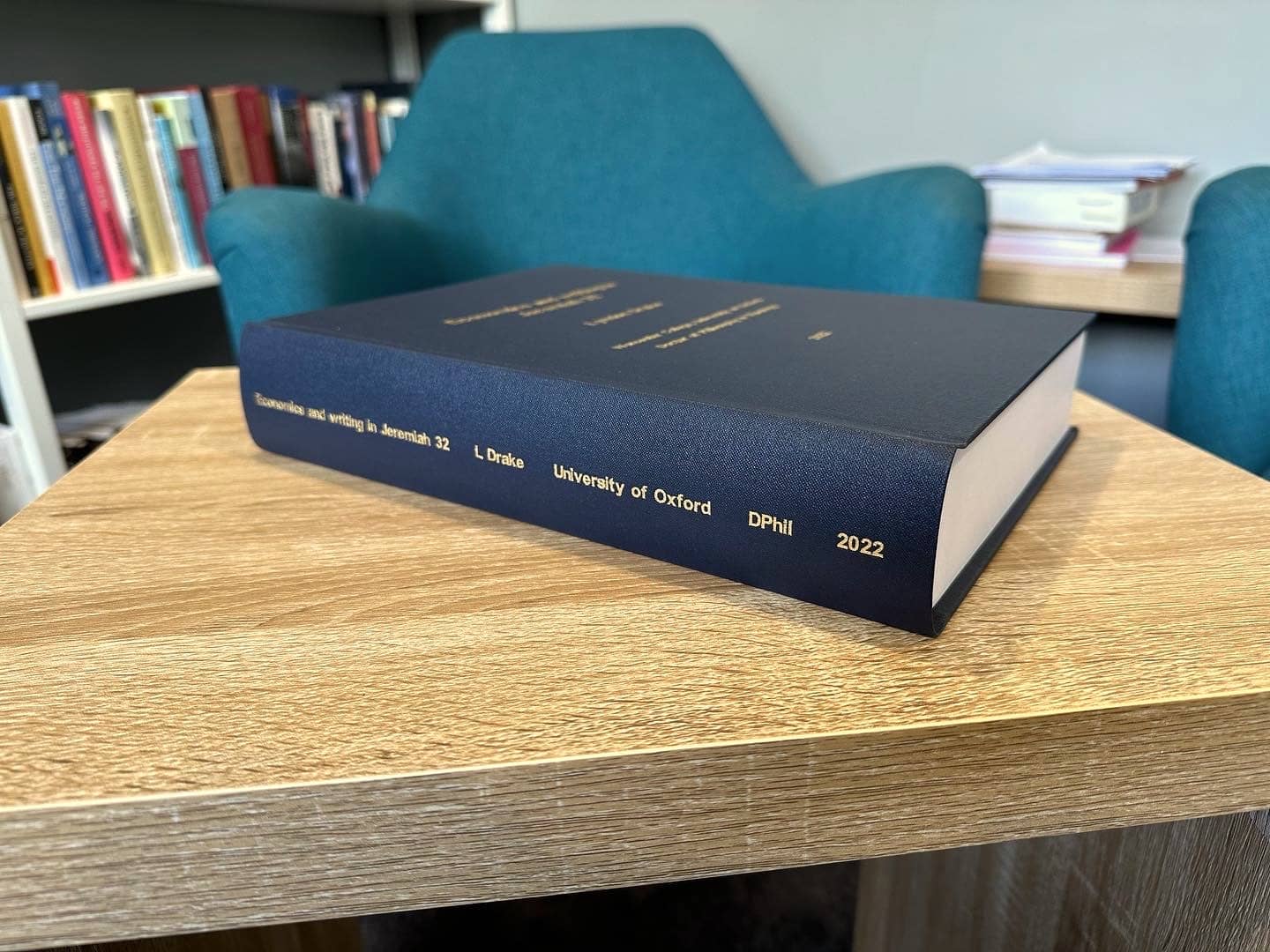Lyndon Drake’s Road to DPhil
Recently, our attention got caught by the extraordinary career of a diligent student from Oxford, England. This May, Lyndon Drake received his Doctor of Philosophy (DPhil) degree in Theology: Congratulations! We are honored to be part of his journey and happy to share some of his thoughts and tips with you.
For the past five years, Lyndon Drake has been working part-time on a DPhil program at Oxford University. The greater part even from the other side of the planet, from his home town of Aotearoa, New Zealand. His journey spanned from September 2017, to submitting the thesis in September 2022 and the viva in December 2022. In May, Lyndon successfully graduated.

Before choosing DEVONthink, he was already working with Mellel and Sente, but was still looking for suitable tools for academic research. And it was quite an adventurous journey through the shoals of software offerings. In the course of a first successful PhD in Computer Science, he initially worked with Emacs. And while Lyndon has nothing but good things to say about it, at some point the amount of work involved in “relearning” Emacs and what he could do with the new org-mode became too great compared to the gains in productivity. A program less complex to use was brought in: DEVONthink.
In addition to his doctoral work, Lyndon accompanied a part-time job. Through DEVONthink, he was able to maintain his research status despite the many interruptions. By creating notes and summaries with links to Markdown documents or even specific pages of a PDF he didn’t have to keep his ideas and annotations in his head between research sessions.
The work I did in DEVONthink remained discoverable.
DEVONthink’s interface made it easy for him personally to quickly dive deep into a topic, e.g., by following links in notes directly or switching to another document, while at the same time being able to quickly return to where he had been before. He runs DEVONthink full-screen on a dedicated screen and with the various display options he can use the available screen space wisely.
DEVONthink To Go has become my favourite tool for annotating PDFs.
On his iPad, Lyndon uses the Apple Pencil to highlight, and then once the PDF is synced back to his Mac, he creates a Markdown document with a summary of the annotations. At times when the now two-time doctor only has his iPad with him, he takes notes within the same system he does everything else in, adds new files or links from his notes to existing documents.
Web clippings are similarly important. Over time he built a large library of references that are or might become relevant to his research. Normally he clips to Markdown but when that’s not possible, such as with pay-walled news sites, he »prints« them as PDFs straight into DEVONthink.
I use a system that is basically a ›Zettelkasten‹ for notes.
The ability to index folders has also come in handy for him. After a long time of indexing the Bookends attachment folders, he is now hacking away at putting PDFs from various sources into DEVONthink and working with them there. Some ebooks consist of multiple PDFs and while he could theoretically combine, OCR, and attach them to the reference in Bookends, it’s time-saving for him to simply keep them in a folder in the Finder. He also has some non-English texts where he wants to have both the scanned version and his own translation or notes visible. Being able to quickly group them means he can get the organization done right away instead of putting it off until later (which probably means: indefinitely). Lyndon also used AppleScript to create a set of reference notes from Bookends.
I submitted my thesis after five years of part-time work, the same time many full-time students need. DEVONthink was a significant part of being able to work efficiently.
But, of course, it’s not all sunshine and rainbows, and there’s always room for improvement (although Lyndon Drake still conveyed it very pleasantly). For writing, Lyndon uses Scrivener, but misses Emacs’ focused, one context setup. His writing lives a lot on notes, so his dissertation document still contains a whole bunch of notes, which he first has to find and transfer to DEVONthink so that all the good ideas don’t disappear now that the dissertation is finished.
A workflow with primary and secondary literature, where documents are supposed to do two things, highlight actual citations while adding your own thoughts and comments, is quite common in university circles. Lyndon’s wish: some convenient way to keep thoughts and comments, annotations and notes, in the same Markdown document attached to the actual PDF.
The main task is to simply sit down every single day and write words.
For Lyndon, the most important tip is not to focus on which tool you use but to invest the time to make sure it’s the right one for you and that it doesn’t let you down halfway through your project. Also, having a concrete word goal, like writing at least 500 words per day, helped him to complete the second dissertation in an impressively short time.

Lyndon, just like you did so kindly in your email, we would like to thank you for the collaboration, the friendly words and for allowing us to accompany you for a small part of your impressive journey. We now hope that DEVONthink will again be useful for your third PhD/DPhil or whatever research you’ll dive in next.
